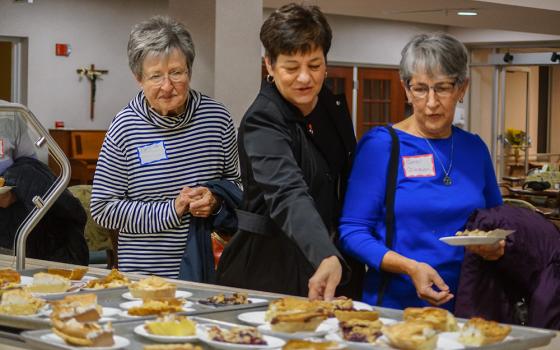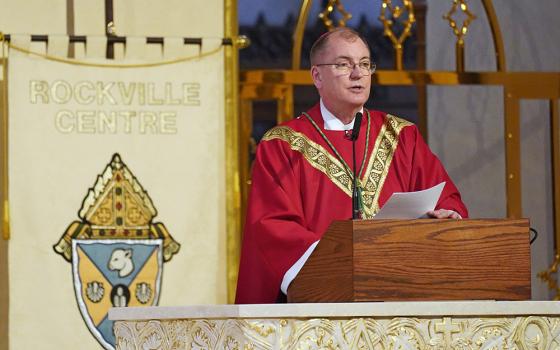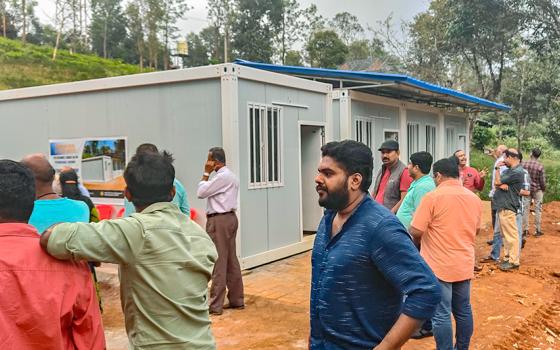
Opinion
As a member of a Catholic Worker Peace Team in Israel and the Israeli-Occupied West Bank, I asked everyone I met, “What will bring lasting peace?”
I asked this question in a Palestinian neighborhood in Jerusalem which is under an Israeli demolition order, in a refugee camp outside Bethlehem, in the Israeli city which has been hit with the largest number of rockets from Gaza, in a Palestinian village where a beloved local was recently killed by Israeli soldiers during a peaceful protest against the seizure of more than half of the community’s farmland, in the Jewish center of Hebron, the West Bank’s most contested city, in Israeli and Palestinian taxis, in the office of an Israeli human rights advocate, in a Palestinian farmhouse adjacent to the West Bank’s largest Jewish settlement, and in Bethlehem University.
I listened to soldiers, professors, doctors, farmers, border guards, children, parents, and grandparents. I expected wide disagreement. I found a remarkable consensus instead. In broad terms, everyone I interviewed agreed with Pope Paul VI’s advice, “If you want peace, work for justice.”
An Israeli soldier, who said that he had been ordered “to kill anything that moves” in Gaza, told me, “If you took away all the governments and just put people together, Jews, Muslims, and Christians would get along fine.” He opposes the Israeli wall being built in the West Bank, supports an independent Palestinian state alongside Israel with Jerusalem as a shared capital, and is convinced that “Hamas and Hezbollah are products of checkpoints and other oppression.”
Angela Godfrey-Goldstein, the Action Advocacy Officer for the Israeli Committee Against House Demolitions, detailed vast discrepancies in the treatment of Palestinians and Jews inside Israel and concluded, “We are creating conditions in which terrorism thrives. It’s that cynical.”
Fakhri Abu Diab, a Palestinian grandfather who unsuccessfully sought permits for his home for many years and is now one of thousands of Palestinians in Jerusalem, whose homes face demolition, said, “A Jewish settler told me, ‘This land is just for us. You can go to Lebanon or Jordan,’ but I answered him, ‘This land is for all of us…. Injustice drives my children to violence.” The grandfather welcomed the head of Rabbis for Human Rights to his home, “to show people in our village that not all Jews are against us. Like all people in the world, there are good and bad.”
Nomika Zion, an Israeli mother and member of Another Voice, a group which builds relationships with Gazans by telephone and email, said, “Israelis don’t know what it’s like to live in the biggest ghetto in the world. Gazans don’t have the freedom to live with dignity; to choose where to live in the world. I don’t have to worry about whether or not my children will have milk in the morning….
The only time I felt my government was actually defending me was when it negotiated a ceasefire with Hamas. Rockets stopped and I felt I could live again without fear, until Israel violated the truce and provoked Hamas.” She favors open borders, an end to military strikes, and a guarantee of the same economic and political rights for everyone.
Eyad Bournat, who has been tear-gassed, beaten, shot, and arrested for leading years of nonviolent protests against the construction of the Israeli wall in his village of Bil’lin, said, “When the Occupation is finished, when we have freedom and justice, there will be peace…. I support two states on the green line [the 1967 border]. Many Israeli friends come here to join our protests. We can live together in peace.” Bournat said this only three weeks after one of his best friends was shot to death at close range by Israeli soldiers.
Attah Jabbar, a Palestinian farmer who has suffered many attacks by Jewish settlers, whose land is now being deprived of water, and whose home faces demolition, said, “I never did anything against the Israeli government…. All the land is not for the Palestinians or the Israelis. It’s God’s land. We are guests here…. I need an easier life for my children, a life of peace, without confiscations, attacks in the night, without hate in the heart.”
Shadi, a young man from the Deheishe Refugee camp, who appeared in the film, “Slingshot Hiphop,” said, “Peace will come with the establishment of either a single state with equal rights for everyone or two states with open borders. Call the single state whatever you want, so long as everyone has equal rights.”
Orr Adam, an Israeli father of 3 from Sderot, whose home was hit by a Palestinian rocket, said, “When rockets fall here, most people say, ‘If they kill our children, we must kill theirs,’ but for lasting peace we need a reconciliation that does not ignore the rights of the other side.” His 17-year-old daughter is a member of Another Voice and even his 8-year-old recognized that Israeli attacks on Gaza only provoked rocket attacks on Sderot.
Writing on the wall in Bethlehem says it all, “Give them justice and they will reward you with peace.” Since Israel is the largest recipient of US military aid, Americans are specially placed to insist on that long-overdue justice for the Palestinians.



